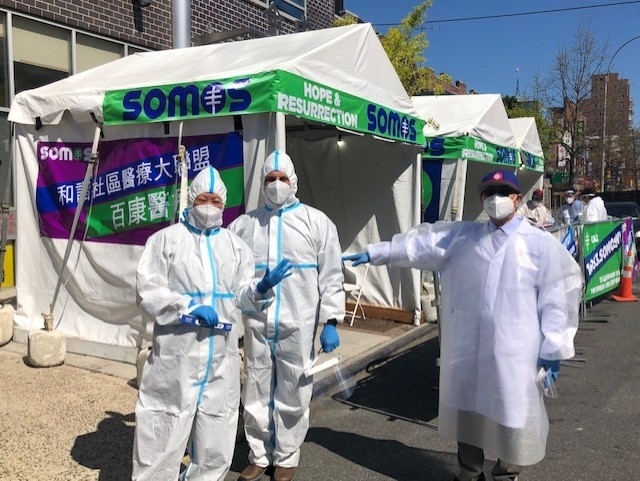
Frank A. Barile ’77P, ’80GP, ’82Ph.D. (center) and his wife, Pauline (left), volunteer at the SOMOS Brooklyn Community Center.
It is no surprise that Frank A. Barile, Ph.D., Professor of Applied and Clinical Toxicology in the Department of Pharmaceutical Sciences in St. John’s University’s College of Pharmacy and Health Sciences, invokes science when asked to explain his motivation for volunteerism and service.
“It is in my DNA,” he said. “I am a New Yorker, and I want to help.” Dr. Barile was born in Brooklyn, NY, and now resides in Queens, NY.
Much like DNA, the genetic material found in all living organisms, volunteerism and service to others are the keys to unlocking and understanding Dr. Barile’s humanitarian makeup. He currently shares his skills and services on the front lines of New York City’s fight against COVID-19.
For more than 20 years, Dr. Barile has been volunteering with New York City Medical Reserve Corps, a trained group of more than 9,000 members who are ready to respond to health emergencies throughout the five boroughs. Over the years, Dr. Barile has responded to local medical emergencies in New York City, including after the terrorist attacks of 9/11, and during epidemics and influenza outbreaks, coastal storms, and other natural disasters.
Presently, Dr. Barile volunteers several days a week at the COVID-19 antibody testing site at the SOMOS Brooklyn Community Center. It is here that the scientist and licensed pharmacist, with his wife Pauline, a physician, at his side, helps to test almost 150 patients daily. The patients range from toddlers to senior citizens, and Dr. Barile works to supervise, administer, and interpret the results of the testing. Antibody tests determine whether someone has recovered from the coronavirus; there is substantial evidence that people may have been infected with the virus without ever being symptomatic.
“My background as a professor at St. John’s is most helpful to the volunteer efforts, but my clinical background as a registered pharmacist sealed my ability to be of service,” observed Dr. Barile.
“I have taught immunology and infectious disease courses for many years, which allow me to conduct tests and even help to train clinicians at the site.”
Dr. Barile earned his bachelor’s and master’s degrees in pharmacy from the College of Pharmacy and Allied Health Professions (now the College of Pharmacy and Health Sciences) and a doctoral degree in toxicology, also from St. John’s. He completed postdoctoral fellowships at the Albert Einstein College of Medicine, Bronx, NY, and at Columbia University in Manhattan. He returned to St. John’s in 2000 as a member of the faculty.
A prolific scholar, he has authored approximately 75 papers and abstracts in peer-reviewed biomedical and toxicology journals, as well as five books and three chapters of works that examine toxicology. He cites two former deans, Andrew J. Bartilucci, Ph.D., and Robert A. Mangione, Ed.D.—who was also his classmate—as friends and mentors who have guided his professional career and cultivated his service efforts.
The most important function of DNA is its ability to replicate itself repeatedly, and at times of crisis in New York City—guided by the Vincentian mission of St. John’s—Dr. Barile’s spirit of service does so again and again. “I will continue to volunteer as long as I am needed.”
Related News
Q&A with School of Education Alumna Linda I. Rosa-Lugo, Ed.D. ’77ED, ’79M.S.Ed.
Linda I. Rosa-Lugo, Ed.D. ’77ED, ’79M.S.Ed., recently accepted a new role as President of the American Speech-Language-Hearing Association (ASHA). Prior to this, Dr. Rosa-Lugo has been an active...
TSOE Alumna Appointed Director of Curriculum in Amityville
Jessica Kemler ’99ED,’22Ed.D.—a double alumna of The School of Education at St. John’s University—began the new year as the new Director of Curriculum in the Amityville, NY, School District. “We are...
Alumna Celebrates Book Launch After Career Change
After developing a passion for helping the younger generation, Ashley Wilson ’14M.S.Ed. pivoted from a career in the music industry to work as an educator. She is also making her mark through her new...
